Sunday, March 22, 2009
The International School of Brussels

While living in Belgium, I attended the International School of Brussels. This was the second of two major international schools within in Belgium. ISB is a private school, with tons of awesome amenities that normal high schools don't include such as a rock climbing wall as well as immense cultural diversity. ISB had schools K through 12th grade in three different buildings, as well as a chateau containing all of the administrative offices. One of the coolest things about ISB is the community. While attending school there, I had friends from all over the world including Australia, England, Ireland, Belgium, the Middle East, Asia, North America. I had friends from almost all of the seven continents. While attending school there I got the opportunity to play American Football as well as Rugby. Both of which were awesome fun and were unique in the sense that both teams were very culturally diverse! I moved to Belgium when I was 14 and in 8th grade. We moved over Christmas break because my dad, working for Kraft Foods, was offered a job over there. My family and I lived there until my sophmore year of high school when I was 16. Then over that Christmas break we moved back to Mundelein, Illinois where I finished highschool.
Brussels/ Bruxelles
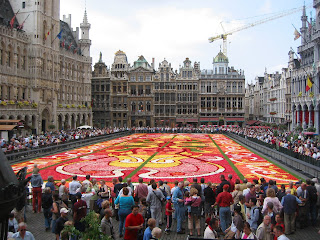
One of my favorite European cities, Brussels includes a great mix of medieval quarters and modern artistic feats. Brussels is the capital of Belgium, as well as the European Union; understandably it is a busy and bustling city with a great mix of many different cultures. Personally, I feel that the Grand Place (pronounced plahs) is one of the coolest areas of the city. The Grand Place is the main market square of Brussels. It is comprised of the Town Hall, guild houses, and the Bread House, with some cafe's and restaurants at either end. The town hall was constructed between the early to mid 1400's. At the top of it's tower stands the patron of Brussels, St. Michael. The Grand Place is also known for it's "flower carpet." The display consists of thousands of begonias and is constructed every second summer. Several other interesting tourist points in Brussels inclu
 de the Atomium and Manneken Pis. The Atomium was designed by Andre Waterkeyn for the 1958 World's Fair, which took place in Brussels. It is 335 ft tall with nine steel spheres connected so that as a whole, it forms the shape of a single iron crystal cell magnified 165 billion times. Each leg contains elevators to each of the spheres which contain various exhibit halls and other public places such as a panoramic view of Brussels. Waterkeyn felt that this monument was symbolic of the era, and soon it became a symbol of the World's Fair and of Brussels. Another fun little tourist attraction is Manneken Pis. Although not an extravagant display, it is within a block or two of the Grand Place and has a fun history. There are several stories about the legend of Manneken Pis, howeve
de the Atomium and Manneken Pis. The Atomium was designed by Andre Waterkeyn for the 1958 World's Fair, which took place in Brussels. It is 335 ft tall with nine steel spheres connected so that as a whole, it forms the shape of a single iron crystal cell magnified 165 billion times. Each leg contains elevators to each of the spheres which contain various exhibit halls and other public places such as a panoramic view of Brussels. Waterkeyn felt that this monument was symbolic of the era, and soon it became a symbol of the World's Fair and of Brussels. Another fun little tourist attraction is Manneken Pis. Although not an extravagant display, it is within a block or two of the Grand Place and has a fun history. There are several stories about the legend of Manneken Pis, howeve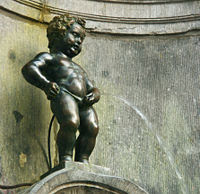.jpg) r my favorite goes like this: During the 14th century, Brussels was under siege by some foreign military. The attackers had thought of a plan to use explosives on the city walls in order to get in. A small boy named Juliaanske from Brussels happened to be spying on the attackers and urinated on the burning fuse, and thus saved Brussels. Another cool thing that I feel is pretty stereotypical European, yet extremely cool, is that every once in a while, instead of water coming out of the boy, they'll tap it to a keg of beer and hand out cups of beer to people passing by. All this tourism certainly makes people hungry, and Brussels accomodates people with probably the coolest armament of restaurants I've ever seen. Not too far from the Grand Place, is the infamous Restaurant Row. Though not really the official name this is what me and my family would call it. It consisted of several narrow roads, closed off to auto traffic, which contained restaurants one after another. Walking through
r my favorite goes like this: During the 14th century, Brussels was under siege by some foreign military. The attackers had thought of a plan to use explosives on the city walls in order to get in. A small boy named Juliaanske from Brussels happened to be spying on the attackers and urinated on the burning fuse, and thus saved Brussels. Another cool thing that I feel is pretty stereotypical European, yet extremely cool, is that every once in a while, instead of water coming out of the boy, they'll tap it to a keg of beer and hand out cups of beer to people passing by. All this tourism certainly makes people hungry, and Brussels accomodates people with probably the coolest armament of restaurants I've ever seen. Not too far from the Grand Place, is the infamous Restaurant Row. Though not really the official name this is what me and my family would call it. It consisted of several narrow roads, closed off to auto traffic, which contained restaurants one after another. Walking through  these streets people are greeted one after another with hosts to the hundreds of restaurants as you pass by. My favorite restaurant down this way is called Aux Armes de Bruxelles. This became kind of a family favorite, and a treat when being able to eat down at this excellent restaurant. Though consisting of many other choices, our favorite quickly became their Flemish Stew and a sea food platter (warm) with an amazing sauce.
these streets people are greeted one after another with hosts to the hundreds of restaurants as you pass by. My favorite restaurant down this way is called Aux Armes de Bruxelles. This became kind of a family favorite, and a treat when being able to eat down at this excellent restaurant. Though consisting of many other choices, our favorite quickly became their Flemish Stew and a sea food platter (warm) with an amazing sauce.http://en.wikipedia.org/wiki/Atomium
http://en.wikipedia.org/wiki/Grand_Place
http://en.wikipedia.org/wiki/Manneken_Pis
http://www.johnnyjet.com/photos/Photo-Brussels-November-2008-51.JPG
Bastogne

If you are interested in historical monuments, and old battle ground sites; Bastogne is a great option. Bastogne, located in Wallone Brabant, is the location of the important Battle of the Bulge during World War II. This is the point where the Americans fought hard against the Germans in their final push thro
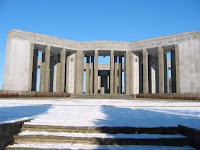 ugh Belgium before retreating back to Germany. The town features some great cafe's and restaurants while incorporting their historical importance. There are several cool monuments on the outskirts of town. Unfortunately, I was never able to make it into the museum, but there is a big World War II museum which is focused around this particular battle. The museum includes some cool tanks from both the allies and axis. As well, right next to the museum is a huge U.S. monument commemorating the fallen U.S. soldiers during the battle. Tourists can climb stairs that will take them to the top, viewing the battlefield around them below as well as names of each of the 50 states.
ugh Belgium before retreating back to Germany. The town features some great cafe's and restaurants while incorporting their historical importance. There are several cool monuments on the outskirts of town. Unfortunately, I was never able to make it into the museum, but there is a big World War II museum which is focused around this particular battle. The museum includes some cool tanks from both the allies and axis. As well, right next to the museum is a huge U.S. monument commemorating the fallen U.S. soldiers during the battle. Tourists can climb stairs that will take them to the top, viewing the battlefield around them below as well as names of each of the 50 states.
Waterloo and Villers Abbey

Waterloo is most famous for it's battle site and because this is the town where Napoleon Bonaparte was finally defeated in his world conquest by the English. Every two years there is a small reinactment of the battle; and every four years there is a full scale reinactment of the battle that took place. The shots can be heard all over town, however unfortunately I was never able to attend this reinactment. Waterloo is a fairly small town compared to Brussels or Gent, but is full of life. Waterloo is home to one of the two main international schools in Belgium, St. John's International School. I didn't go to school here, however, I did live only three blocks away from the school. They were a private, catholic school which didn't have American football, and hence one of the reasons why I didn't want to attend school there. Waterloo to me meant a place where friends could meet up, get a few drinks and decide whether or not we wanted to go to the clubs in Brussels or stay in Waterloo. There were several places that we would go to for a fun night out. Snookers was a great pool hall where you could pay per hour and enjoy a fun environment of pool, beer drinking and peanuts. While I was over in Europe, the European Cup (football/soccer) was taking place. This happens every four years, in between the World Cup which will happen every four years as well but in two year intervals with the European Cup. Soccer to the Europeans is life, and so my friends and I would head to Snooker's during a big match have a few beers, play some pool and watch the games on the big screens. To me being at Snooker's was one of my fondest memories of my time in Belgium. Literally right next door was more of a club type setting called The New Messena. Although it wasn't the biggest club, my friends and I would take our corner and have a blast drinking all night long. When we got hungry, we'd walk a block to one of my favorite restaurants in Belgium. I can't remember the name but it was a little pita place who's pita's were literally quite amazing, especially after having a few drinks in ya! Another great thing about partying in Water
 loo was that for me, I could walk to any of these places within 20 minutes or so. So after a long night of drinking, my friends and I would walk back to my house to crash. My address in Belgium was Clos Pegase 1 Waterloo, Belgium. I lived in probably one of the coolest houses I've ever seen. In each of our rooms, my sister and I each had our own showers and sinks. As well, we each had our own lofts. When walking into our room there would be a normal downstairs portion to the room, but each of us had stairs to go up into another equally large loft room. My sister was even lucky enough to get a third room which was doored off from her loft. Not too far from Waterloo is a really cool historical site called Villers Abbey. This Abbey was founded in 1146 by monks. Among other things, a big part of their lives consisted around the brewing of beer. Once a year for about a week, visiters can purchase a similar blend of either white or dark beer.
loo was that for me, I could walk to any of these places within 20 minutes or so. So after a long night of drinking, my friends and I would walk back to my house to crash. My address in Belgium was Clos Pegase 1 Waterloo, Belgium. I lived in probably one of the coolest houses I've ever seen. In each of our rooms, my sister and I each had our own showers and sinks. As well, we each had our own lofts. When walking into our room there would be a normal downstairs portion to the room, but each of us had stairs to go up into another equally large loft room. My sister was even lucky enough to get a third room which was doored off from her loft. Not too far from Waterloo is a really cool historical site called Villers Abbey. This Abbey was founded in 1146 by monks. Among other things, a big part of their lives consisted around the brewing of beer. Once a year for about a week, visiters can purchase a similar blend of either white or dark beer.
Wednesday, March 11, 2009
Brugge
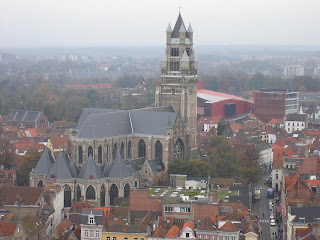
Brugge is another great tourist city located in Vlaams Brabant, or Flanders. Brugge is probably known more for its tourism than Ghent. Brugge is rooted by its canal system and it's ancient buildings that make for a really amazing ensemble. Brugge is known as the Venice of the north because of all the canals running through the city. Tourists can take canal boat tours throughout the city, getting a first hand look at the city while enjoying a historical tour guide. One of the great things that people can find in Europe is the sense of age, how the buildings are still standing from the 15th and 16th centu ries, and how people really get a feel for the medieval quarters. Brugge does exactly that with its cobbled stone roads, and ancient buildings. Like many tourist cities, Brugge includes a beautiful old cathedral full of amazing history. In this cathedral, one can find the only statue created by Michelangelo outside of Italy. One of my favorite things to eat when in Brugge is their wurst stands or shops. It's a simple light snack, but extremely tasty. I personally suggest their wurst that are wrapped in the croissants.
ries, and how people really get a feel for the medieval quarters. Brugge does exactly that with its cobbled stone roads, and ancient buildings. Like many tourist cities, Brugge includes a beautiful old cathedral full of amazing history. In this cathedral, one can find the only statue created by Michelangelo outside of Italy. One of my favorite things to eat when in Brugge is their wurst stands or shops. It's a simple light snack, but extremely tasty. I personally suggest their wurst that are wrapped in the croissants.
 ries, and how people really get a feel for the medieval quarters. Brugge does exactly that with its cobbled stone roads, and ancient buildings. Like many tourist cities, Brugge includes a beautiful old cathedral full of amazing history. In this cathedral, one can find the only statue created by Michelangelo outside of Italy. One of my favorite things to eat when in Brugge is their wurst stands or shops. It's a simple light snack, but extremely tasty. I personally suggest their wurst that are wrapped in the croissants.
ries, and how people really get a feel for the medieval quarters. Brugge does exactly that with its cobbled stone roads, and ancient buildings. Like many tourist cities, Brugge includes a beautiful old cathedral full of amazing history. In this cathedral, one can find the only statue created by Michelangelo outside of Italy. One of my favorite things to eat when in Brugge is their wurst stands or shops. It's a simple light snack, but extremely tasty. I personally suggest their wurst that are wrapped in the croissants. http://ccrma.stanford.edu/~asmaster/photos/BruggeTowerViewCathedral.jpg (Brugge Cathedral Picture)
Ghent


Ghent is the biggest city and the capital of the East Flanders province. During the middle ages it became one of the biggest and richest cities of northern Europe; growing greatly because of the trade allowed from the two rivers Sheldt and Lys. The current population of Gent is 237,250 people which makes it the second most populated city in Belgium. Every year the town hosts a ten day street festival known as "Ghent Fests." During these ten days there are a variety of street performances and music festivals that take place. There are on average around 2 million people that will go attend the Ghent festival starting on July 21. People claim Ghent to be not as touristy as Brugge to the north, however I beg to differ. Ghent offers some really cool and interesting sights such as their walled castle in the middle of town. Another example is the medieval square which includes a magnificent Cathedral; as well as the Belfort en Lakenhalle. Dating from 1425 to 1445, this Gothic Cloth Hall and Belfry tower form a magnificent medieval duo. Though I am not particularly familiar with any restaurants located in Ghent, I do have some suggestions including Brasserie Pakhuis, Jan Breydel, and Keizershof.
http://travel.nytimes.com/travel/guides/europe/belgium/ghent/restaurants.html (Ghent Restaurants and attractions)
http://en.wikipedia.org/wiki/Gentse_Feesten (Ghent Festivals)
http://www.europeword.com/blog/wp-content/uploads/2008/10/europefestivalghent.gif (Ghent Festivals picture)
Vive la Belgique! Levendig Belgie!
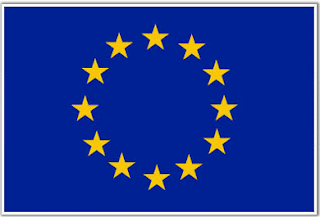
When talking of tourism, many people think of France, Germany, or England, etc. Unfortunately, many people skip over one of the more important countries in the EU (European Union), Belgium! Other than Europeans, many people don't realize that Belgium is the capital of the EU, sort of like the Washington D.C. of Europe. Belgium is run by a parliamentary system, although they still have the traditional king and queen. Currently the king of Belgium is King Albert II. Belgium is a country that is split into two main regions; Flanders to the north, and Wallonia to the south. There is also a small German speaking portion along the south eastern border near Germany. Flanders is traditionally known for their beautiful tapestries, beautiful medieval towns, and their World War 1 battle sites. The people of flanders speak a dialect of Dutch known as Flemish. Some great tourist cities of Flanders include Gent and Brugge. Wallonia to the south is the French speaking part of Belgium. This is the part that I lived in, for the two years that I was there. I lived in a town called Waterloo which many people may know to be where Napoleon Bonaparte was finally beaten by the English. Another big historical town of Wallonia is Bastogne, where the World War II battle of the bulge took place. Brussels, the capital of Belgium, is the centerpiece of the entire country, literally. Brussels splits the country into it's respective two regions. There is no language barrier here, however, most of the people will be found speaking French.
http://astro.temple.edu/~dcm/european-union-flag.gif (European Union Flag)
http://www.33ff.com/flags/XL_flags/Belgium_flag.gif (Belgian Flag)
Subscribe to:
Comments (Atom)